Archimedes was the greatest scientist of antiquity. He made stunning theoretical discoveries about concepts such as pi and infinity, and designed some of the most advanced technology of his age.
He is also responsible for one of the worst puzzles in history.
Its a stinker, believe me.
The cattle problem is difficult, inelegant and absurd. It is nevertheless a perfect place to begin a book of recreational problems. For a start: Archimedes. Secondly, it is a fascinating historical oddity. Lastly, bad puzzles illuminate what makes good ones good. Our dissection of the Archimedean herd explains what the rest of the puzzles in this book will not be like. You will be grateful.
THE CATTLE PROBLEM
The sun god had a herd of cattle that grazed on the plains of Sicily. The bulls and cows came in four colours: white, black, yellow and dappled, such that the numbers of each type could be expressed in the following way.
White bulls = ( 1/2 + 1/3 ) black bulls + yellow bulls,
Black bulls = ( 1/4 + 1/5 ) dappled bulls + yellow bulls,
Dappled bulls = ( 1/6 + 1/7 ) white bulls + yellow bulls,
White cows = ( 1/3 + 1/4 ) black herd,
Black cows = ( 1/4 + 1/5 ) dappled herd,
Dappled cows = ( 1/5 + 1/6 ) yellow herd,
Yellow cows = ( 1/6 + 1/7 ) white herd,
White bulls + black bulls = a square number,
Dappled bulls + yellow bulls = a triangular number.
What is the total size of the herd?
Urgh. Before we try to digest this unappetising soup of fractions, heres its curious backstory. The problem was discovered in a library in Germany in the eighteenth century, two thousand years after Archimedes died. Written in Greek in the form of a poem made up of 22 couplets, it was found in a manuscript that no one had looked at before, accompanied by a note stating that Archimedes had sent it to Eratosthenes, head of the library at Alexandria.
On the positive side, the problem is set in verse. At least its author aimed to entertain. The maths, on the other hand, is less jolly. The cattle problem demands a farmyard of algebra. The first seven lines can be written as seven equations in eight unknowns. With enough patience and enough paper, after much tedious computation and shuffling around of variables, you will discover that the smallest possible size of the herd that satisfies the first seven lines is 50,389,082. (Which means Sicily would have a bull or a cow for every 500 square metres.)
If youve solved the puzzle thus far, Archimedes congratulates you. But dont get smug. Thou can not be regarded as of high skill, he warns. Weve not got to the hard bit yet.
The eighth line states that the number of white and black bulls is a square number, meaning a number like 1, 4, 9 or 16 that is the square of another number (i.e., 12, 22, 32, 42). If this property is included, the smallest possible size of the herd is 51,285,802,909,803. (Sicily now has about 2,000 animals per square metre, meaning that the island is entirely covered with cattle, squashed like sardines and stacked hundreds of metres high.) This calculation requires a little bit more advanced algebra, but not too much. Gotthold Ephraim Lessing, the German librarian who discovered the problem, showed it to a mathematician friend who was able to come up with this solution.
The final line is the killer. It states that the number of dappled and yellow bulls is a triangular number, meaning a number that can be arranged in a dot triangle, such as 3, 6, 10 as in  and so on, with an extra line each time. Bam! Archimedes cattle problem is now beyond the scope of eighteenth-century mathematics.
and so on, with an extra line each time. Bam! Archimedes cattle problem is now beyond the scope of eighteenth-century mathematics.
For the next hundred years, the bovine brainteaser was a celebrated unsolved problem. It was rumoured that Carl Friedrich Gauss, the greatest mathematician of the nineteenth century, had solved it completely. The first person to publish a partial solution, however, was fellow German August Amthor in 1880, who revealed that the smallest possible herd was a number beginning with 766 and continuing for another 206,542 digits. In other words, a number so ridiculously huge that the universe would not be able to contain this herd even if every bull and cow was as small as an atom.
Undeterred by the scale of the job, in 1889 three friends in Illinois with nothing better to do started to work out the other digits. After four years toil they had calculated 32 of the digits on the left side of the number and 12 on the right. The full solution to the cattle problem, however, required the arrival of the computer age. In 1965 a supercomputer took 7 hours and 45 minutes to print out the number, which ran to 42 sheets of A4.
Lessing and others have questioned whether Archimedes was indeed the author of the cattle problem. No reference to the puzzle exists in any other Greek writing, and Archimedes could not possibly have known the answer to the question he supposedly set. Yet some academics are convinced it does date to him. Archimedes was fascinated by extraordinarily large numbers; in his short text, The Sand Reckoner, he devises a new number system in order to estimate the number of grains of sand that would fill the universe. (His estimate: 1063 grains). Perhaps the point of the cattle problem was not to solve it at all, but to show how nine simple statements using unit fractions could determine a number that (in Archimedess time) was beyond all comprehension. To concoct a whimsical, easily understandable problem that nevertheless remains unsolved for more than 2,000 years is arguably the mark of (evil) genius. If thou hast computed [the answer], O friend, and found the total number of cattle, ends the verse, then exult as a conqueror, for thou hast proved thyself most skilled in numbers. Quite.
As a puzzle, the cattle problem is less a piece of recreational maths than an overly complicated exercise in solving simultaneous equations.
The remaining puzzles in this book:
Prize insight over computation.
Engage basic competence rather than technical skills.
Deal in numbers that can be written down on fewer than 42 sheets of A4.
Can be fully solved in less than 2,000 years.
Ill take my lead from Archimedes in only one way: his zoological choice of subject matter.
This book kicks off with a chapter of puzzles about animals. Randy rabbits, mischievous moggies, frogs, flies, lions, camels, chameleons and more. Animal puzzles do not yet constitute a mathematical field of their own, but they do provide a delightful and diverse bestiary of brainteasers, allowing me to showcase some of my favourite puzzles from the Middle Ages to the present day.
After visiting the animal kingdom, we will find ourselves in peril. In real life you may never have been abandoned on an island, trapped in a maze, locked in a room or stuck on death row. In puzzle-land, however, we get into these scrapes




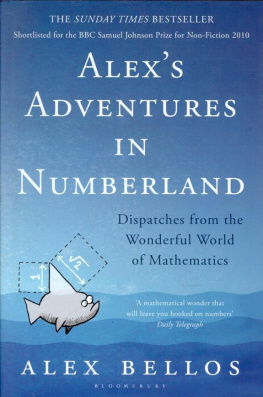
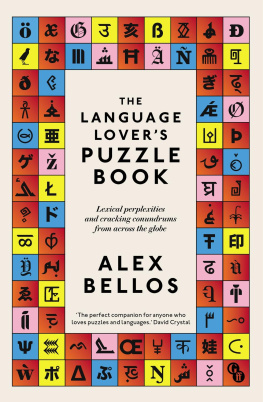
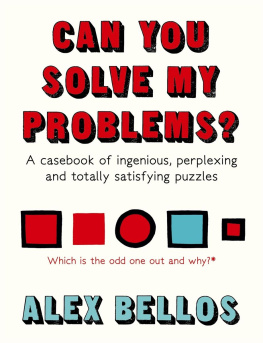


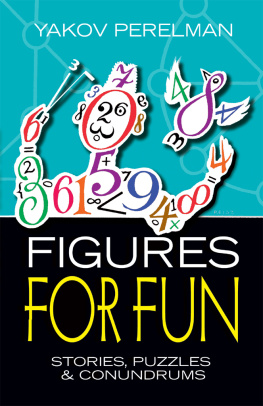

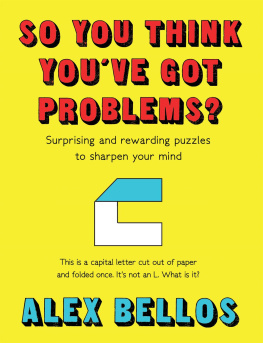
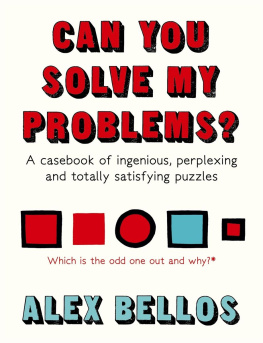
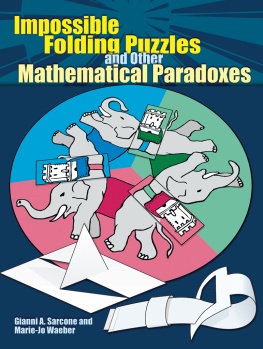


 and so on, with an extra line each time. Bam! Archimedes cattle problem is now beyond the scope of eighteenth-century mathematics.
and so on, with an extra line each time. Bam! Archimedes cattle problem is now beyond the scope of eighteenth-century mathematics.